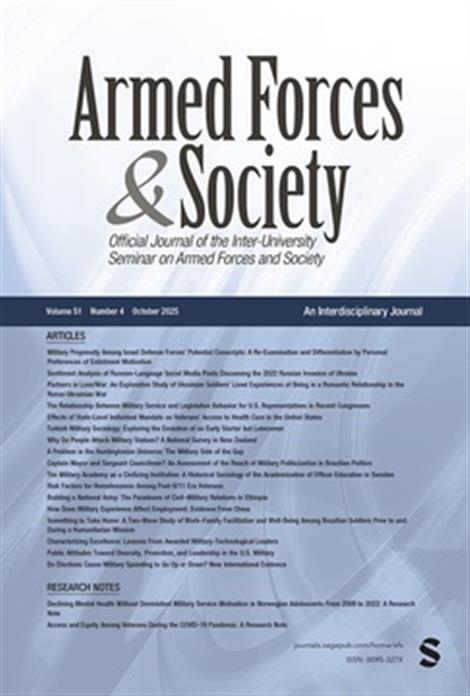


Military Propensity Among Israel Defense Forces’ Potential Conscripts: A Re-Examination and Differentiation by Personal Preferences of Enlistment Motivation
Israel maintains a law-based mandatory military service, preserving its “People’s Army” model. Despite societal changes, youth motivation to serve remains high. Based on a large survey, this study reexamines Moskos’ Institution/Occupation model, revealing that Israeli youth balance two motives—self-actualization and contributing to national security—within their approach to compulsory service.
Sentiment Analysis of Russian-Language Social Media Posts Discussing the 2022 Russian Invasion of Ukraine
This study analyzed 1,393,245 Russian-language social media posts (Feb–Sep 2022) about the war in Ukraine from VK and Telegram. Using VADER sentiment analysis, 15,000 posts showed early positive sentiment shifting to neutrality. VK mirrored this positive-to-negative trend, while Telegram remained neutral, revealing initial platform differences that diminished over time.
A Playstation Mentality to Killing? Adverse Psychological Consequences in Drone Pilots and the Stigmatization thereof in the Military
Drone pilots may be far from the battlefield, but are they truly untouched by war? This article explores the hidden mental health struggles of drone operators and how a “video game” image increases stigma. Based on expert interviews from three countries, it sheds light on the psychological toll of remote warfare—and the silence surrounding it.
Revisiting Propensity to Serve and Motivations to Enlist: Insights and Implications for Contemporary Military Recruitment Challenges and Research
Why do people still join the military—and what’s changing? Revisiting a landmark 2006 study, this article explores why understanding enlistment motivations is key to tackling today’s recruitment crisis. A must-read for anyone interested in military sociology, policy, or how to inspire the next generation of soldiers in an era of declining willingness to serve.
The Military and the Family as Greedy Institutions: Then and Now
How do military and family life compete for loyalty and time? In this personal reflection, Mady Segal revisits her influential concept of "greedy institutions" and shares how mentorship, collaboration, and students shaped her thinking. A must-read for anyone curious about the lasting tensions between duty and domestic life—then and now.
Armed Forces & Society ist ein international anerkanntes Fachjournal, das sich interdisziplinär mit militärischen Institutionen, Sicherheitspolitik und zivil-militärischen Beziehungen befasst. Es veröffentlicht empirische Forschung, theoretische Beiträge und Rezensionen aus Politikwissenschaft, Soziologie, Geschichte und Rechtswissenschaft. Die Artikel werden peer-reviewed und bieten Vergleichsstudien, Fallanalysen sowie methodische Innovationen. Policymaker, Wissenschaftler und Militärpraktiker nutzen das Magazin als verlässliche Quelle für Evidenz-basierte Einblicke in Transformationsprozesse, Führung, Ethik und Strategiedebatten. Die Zeitschrift fördert einen kritischen Dialog über globale Sicherheitsherausforderungen und trägt zur theoretischen und praktischen Weiterentwicklung des Feldes bei. Sie erscheint vierteljährlich und wird von einem internationalen Herausgeberkreis betreut mit rigorosem Qualitätsstandard garantiert.
Die Zeitschrift Armed Forces & Society bietet interdisziplinäre Analysen zu Militär, Sicherheitspolitik und Gesellschaft. Sie veröffentlicht empirische Studien, theoretische Beiträge und vergleichende Fallanalysen zu Armeen, Veteranen, Zivil-Militär-Beziehungen, Rekrutierung, Einsätzen und Rüstungspolitik. Fachartikel kombinieren Politikwissenschaft, Soziologie und Rechtswissenschaft, ergänzt durch Buchrezensionen und Methodenberichte. Praxisrelevante Diskussionen adressieren Strategien, Menschenrechte und Friedenssicherung. Als renommiertes Fachmagazin fördert sie Evidenzbasierung und kritischen Diskurs, richtet sich an Wissenschaftler, Praktiker und Studierende und trägt zur internationalen Debatte über militärische Institutionen und ihre gesellschaftlichen Auswirkungen bei. Sie veröffentlicht auch Policy-Papiere, empirische Datensätze, interaktive Grafiken sowie gelegentliche Sonderausgaben zu Technik, Cybersecurity, Geopolitik und humanitärer Intervention mit hoher Relevanz.
Armed Forces & Society
richtet sich an Wissenschaftler, Sicherheitsanalysten und politisch Interessierte, die fundierte Einblicke in zivil-militärische Beziehungen, strategische Studien und sicherheitspolitische Debatten suchen. Studierende der Friedens- und Konfliktforschung profitieren ebenso wie Praktiker aus Verteidigungsministerien, NGOs und internationalen Organisationen. Leser erwarten empirische Untersuchungen, kritische Theorien und vergleichende Fallstudien sowie praxisnahe Analysen zu Ausbildung, Einsatzdoktrinen und gesellschaftlicher Kontrolle der Streitkräfte. Wer evidenzbasierte Argumente schätzt und interdisziplinäre Perspektiven bevorzugt, findet hier vertiefte Reflexionen, methodische Transparenz und Impulse für politische Entscheidungsprozesse. Kurz: Das Magazin bietet anspruchsvolle Orientierung für Fachpublikum und engagierte Laien. Es verbindet theoretische Tiefe mit praktischer Relevanz für aktuelle, praxisnahe sicherheitspolitische Fragen.Der Verlag hinter dem Magazin Armed Forces & Society ist SAGE Publications Inc., ein international renommiertes Fachverlagsunternehmen mit Schwerpunkt Sozial- und Geisteswissenschaften. SAGE unterstützt Wissenschaftlerinnen und Wissenschaftler durch hochwertige Peer Reviewed-Zeitschriften, Monografien und digitale Plattformen. Als Herausgeber legt SAGE großen Wert auf rigorose Begutachtung, methodische Präzision und globale Reichweite, um Forschung zur Militärsoziologie, Sicherheitsstudien und zivil-militärischen Beziehungen nachhaltig zu fördern. Der Verlag fördert den Austausch zwischen akademischer Gemeinschaft, Politikberatung und Praxis, bietet umfangreiche Archivzugänge und verschiedene Publikationsmodelle. Dadurch gewährleistet SAGE, dass Beiträge von Armed Forces & Society weltweit sichtbar, zitierfähig und akademisch relevant bleiben. Er trägt zur Qualitätssteigerung der Disziplin bei.
Military Propensity Among Israel Defense Forces’ Potential Conscripts: A Re-Examination and Differentiation by Personal Preferences of Enlistment Motivation
Israel maintains a law-based mandatory military service, preserving its “People’s Army” model. Despite societal changes, youth motivation to serve remains high. Based on a large survey, this study reexamines Moskos’ Institution/Occupation model, revealing that Israeli youth balance two motives—self-actualization and contributing to national security—within their approach to compulsory service.
Sentiment Analysis of Russian-Language Social Media Posts Discussing the 2022 Russian Invasion of Ukraine
This study analyzed 1,393,245 Russian-language social media posts (Feb–Sep 2022) about the war in Ukraine from VK and Telegram. Using VADER sentiment analysis, 15,000 posts showed early positive sentiment shifting to neutrality. VK mirrored this positive-to-negative trend, while Telegram remained neutral, revealing initial platform differences that diminished over time.
A Playstation Mentality to Killing? Adverse Psychological Consequences in Drone Pilots and the Stigmatization thereof in the Military
Drone pilots may be far from the battlefield, but are they truly untouched by war? This article explores the hidden mental health struggles of drone operators and how a “video game” image increases stigma. Based on expert interviews from three countries, it sheds light on the psychological toll of remote warfare—and the silence surrounding it.
Revisiting Propensity to Serve and Motivations to Enlist: Insights and Implications for Contemporary Military Recruitment Challenges and Research
Why do people still join the military—and what’s changing? Revisiting a landmark 2006 study, this article explores why understanding enlistment motivations is key to tackling today’s recruitment crisis. A must-read for anyone interested in military sociology, policy, or how to inspire the next generation of soldiers in an era of declining willingness to serve.
The Military and the Family as Greedy Institutions: Then and Now
How do military and family life compete for loyalty and time? In this personal reflection, Mady Segal revisits her influential concept of "greedy institutions" and shares how mentorship, collaboration, and students shaped her thinking. A must-read for anyone curious about the lasting tensions between duty and domestic life—then and now.
Armed Forces & Society ist ein international anerkanntes Fachjournal, das sich interdisziplinär mit militärischen Institutionen, Sicherheitspolitik und zivil-militärischen Beziehungen befasst. Es veröffentlicht empirische Forschung, theoretische Beiträge und Rezensionen aus Politikwissenschaft, Soziologie, Geschichte und Rechtswissenschaft. Die Artikel werden peer-reviewed und bieten Vergleichsstudien, Fallanalysen sowie methodische Innovationen. Policymaker, Wissenschaftler und Militärpraktiker nutzen das Magazin als verlässliche Quelle für Evidenz-basierte Einblicke in Transformationsprozesse, Führung, Ethik und Strategiedebatten. Die Zeitschrift fördert einen kritischen Dialog über globale Sicherheitsherausforderungen und trägt zur theoretischen und praktischen Weiterentwicklung des Feldes bei. Sie erscheint vierteljährlich und wird von einem internationalen Herausgeberkreis betreut mit rigorosem Qualitätsstandard garantiert.
Die Zeitschrift Armed Forces & Society bietet interdisziplinäre Analysen zu Militär, Sicherheitspolitik und Gesellschaft. Sie veröffentlicht empirische Studien, theoretische Beiträge und vergleichende Fallanalysen zu Armeen, Veteranen, Zivil-Militär-Beziehungen, Rekrutierung, Einsätzen und Rüstungspolitik. Fachartikel kombinieren Politikwissenschaft, Soziologie und Rechtswissenschaft, ergänzt durch Buchrezensionen und Methodenberichte. Praxisrelevante Diskussionen adressieren Strategien, Menschenrechte und Friedenssicherung. Als renommiertes Fachmagazin fördert sie Evidenzbasierung und kritischen Diskurs, richtet sich an Wissenschaftler, Praktiker und Studierende und trägt zur internationalen Debatte über militärische Institutionen und ihre gesellschaftlichen Auswirkungen bei. Sie veröffentlicht auch Policy-Papiere, empirische Datensätze, interaktive Grafiken sowie gelegentliche Sonderausgaben zu Technik, Cybersecurity, Geopolitik und humanitärer Intervention mit hoher Relevanz.
Armed Forces & Society
richtet sich an Wissenschaftler, Sicherheitsanalysten und politisch Interessierte, die fundierte Einblicke in zivil-militärische Beziehungen, strategische Studien und sicherheitspolitische Debatten suchen. Studierende der Friedens- und Konfliktforschung profitieren ebenso wie Praktiker aus Verteidigungsministerien, NGOs und internationalen Organisationen. Leser erwarten empirische Untersuchungen, kritische Theorien und vergleichende Fallstudien sowie praxisnahe Analysen zu Ausbildung, Einsatzdoktrinen und gesellschaftlicher Kontrolle der Streitkräfte. Wer evidenzbasierte Argumente schätzt und interdisziplinäre Perspektiven bevorzugt, findet hier vertiefte Reflexionen, methodische Transparenz und Impulse für politische Entscheidungsprozesse. Kurz: Das Magazin bietet anspruchsvolle Orientierung für Fachpublikum und engagierte Laien. Es verbindet theoretische Tiefe mit praktischer Relevanz für aktuelle, praxisnahe sicherheitspolitische Fragen.Der Verlag hinter dem Magazin Armed Forces & Society ist SAGE Publications Inc., ein international renommiertes Fachverlagsunternehmen mit Schwerpunkt Sozial- und Geisteswissenschaften. SAGE unterstützt Wissenschaftlerinnen und Wissenschaftler durch hochwertige Peer Reviewed-Zeitschriften, Monografien und digitale Plattformen. Als Herausgeber legt SAGE großen Wert auf rigorose Begutachtung, methodische Präzision und globale Reichweite, um Forschung zur Militärsoziologie, Sicherheitsstudien und zivil-militärischen Beziehungen nachhaltig zu fördern. Der Verlag fördert den Austausch zwischen akademischer Gemeinschaft, Politikberatung und Praxis, bietet umfangreiche Archivzugänge und verschiedene Publikationsmodelle. Dadurch gewährleistet SAGE, dass Beiträge von Armed Forces & Society weltweit sichtbar, zitierfähig und akademisch relevant bleiben. Er trägt zur Qualitätssteigerung der Disziplin bei.
